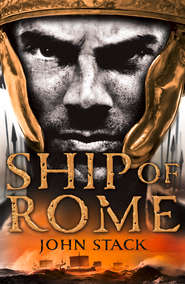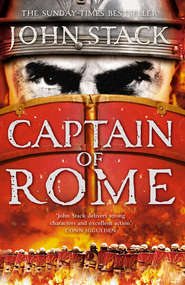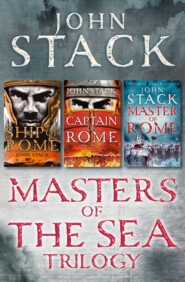По всем вопросам обращайтесь на: info@litportal.ru
(©) 2003-2024.
✖
Armada
Автор
Год написания книги
2018
Настройки чтения
Размер шрифта
Высота строк
Поля
He jabbed his sword downwards, looking for the killing strike against the groin. Evardo blocked and made to counter strike but again Robert struck low, forcing the commander to defend. Without warning Robert slashed his sword upward and Evardo tilted back to avoid the point of the sword, hooking his own blade around. Robert followed through. The blades rasped against each other, forcing the Spaniard ever backwards and Evardo lost his footing as he pitched over the inert body of a fallen crewman.
Robert was immediately upon him, his sword darting for the Spaniard’s chest. In that instant he caught sight of something that made him stop and his arm trembled as he held the point of his sword an inch from the captain’s flesh.
‘Yield,’ he said, the muscles of his arm and shoulder calling on him to drive home the strike, his eyes locked on the crucifix hanging around the commander’s neck, the reason he hesitated to deliver the fatal blow.
Evardo looked up at the mottled face of his enemy. He felt the grip of his sword and knew with certainty that if he moved to knock away the Englishman’s blade he was a dead man. A curse rose to his lips but he held back, the instinct to survive surfacing through his anger. The sounds of battle swept over him and he heard the tone of desperation in the Spanish cries. The Halcón was lost. What chance his crew had had been lost from the moment the English counter attacked. He looked with hatred upon the man who had precipitated that reverse.
‘I yield,’ he spat and he stood up slowly, his arms outstretched.
Robert kept his sword charged, wary of the Spaniard, knowing that the initial relief of salvation could rapidly twist into shame and an overriding urge to fight on.
The last of the Spanish defence collapsed quickly. Many saw their captain capitulate and they threw up their arms to plead for quarter. Others fought on, but they were hopelessly outnumbered and easily overwhelmed. As the last blow was struck, Evardo looked about the ruin that was his main deck. He drew his sword across and, taking the blade in his hand, presented the hilt to Robert.
‘I am Comandante Evardo Alvarez Morales of the Halcón,’ he said evenly, with only his eyes betraying the depth of his anguish and bitterness.
‘Robert Varian, Master of the Retribution.’
Evardo nodded, noting the name. ‘The ship is yours, señor,’ he said and the words tore the fabric of his soul as he lowered his gaze to his empty sword hand. He glanced up, studying the face of his enemy. There would be another time, another battle, God would see to that, and Evardo vowed he would make the Englishman pay a heavy coin for taking the Halcón.
Robert stepped back through the ranks of his own men, a sword hanging loosely from each hand. He limped heavily. His breeches were already soaked through with blood and the forgotten injury to his left arm began to throb. A surge of bile rose to the back of his throat and he swallowed hard. He sheathed his own sword and reached out for the gunwale, grateful for the support. Through the remnants of battle smoke on the main deck of the Halcón, he looked out over the scene fading in the last light of the day.
On all sides the pillage of the Spanish supply fleet continued unabated. It was as if the slaughter onboard the galleon had never taken place and Robert sought out the Retribution, taking a strange comfort from the sight although he had not long known the ship. He felt a hand on his shoulder and turned. It was Shaw.
‘Drink,’ he said and handed Robert a flask.
Robert opened his parched lips and drank deeply. It was Madeira wine, and the liquid burned his throat. He spluttered but brought the flask back to his mouth, eager to rid himself of the foul taste of battle. He nodded to the boatswain and handed him back the flask. For a moment the wine checked the slip of his flagging strength.
‘Secure the ship,’ he said, ‘make sure none of those poxed Spaniards are skulking below decks, and start sending the injured back to the Retribution.’
‘Aye, Master,’ Shaw replied and shouted to the men around him, organizing them quickly.
Robert felt light headed. He glanced at his injured leg. The pain had turned to a dull ache. The enemy captain’s sword in his left hand felt heavy and he looked to it, pausing for the first time to examine why he had spared the Spaniard. An uncontrollable fury had driven him to charge when all around him faltered and when he had recognized the captain for who he was, that fury had only intensified. Yet he had stayed his blade from delivering the fatal strike because of the simple crucifix he had seen hanging around the Spaniard’s neck.
The man was his enemy, as were all who threatened the sovereignty of Elizabeth and the sacred soil of England. But Robert shared a bond with these Spaniards, a union of faith that stopped him from striking home the point of his sword past a crucifix. His mind flooded with questions about the depths of his own loyalties but he savagely repressed them, recalling instead the blind fury of his charge, the anger he had felt at the butchery of his countrymen and captain. England commanded his loyalty first, not his faith. He repeated these words to himself as darkness began to encroach from the periphery of his vision. It quickly enveloped him and as he slipped into unconsciousness the mantra faded from his lips, replaced by a creeping doubt that his words held any meaning.
CHAPTER 4
18th May 1587. Lisbon, Portugal.
Nathaniel Young, the Duke of Greyfarne, descended from his carriage and looked out over the harbour of Lisbon. It was a magnificent sight and Young stepped forward to the edge of the dock, glancing left and right to the myriad smaller supply and ordnance ships. Further out the mighty galleons of the fledgling Spanish Armada pulled gently on their anchor lines beneath a canopy of masts and rigging. He held his breath, thinking of the day when the harbour would be filled with such ships.
‘They are impressive, no?’
Young spun around and smiled as he recognized Don Rodrigo de Torres, one of King Philip’s closest advisors. He was dressed in austere clothes, a black embroidered doublet and gown and a high necked jerkin that accentuated his height. It was a style made popular by the King and Young wondered if any man in Spain now dared to dress differently.
‘They are indeed a blessed sight before God,’ he replied, his Spanish still heavily accented even after nearly twenty years. Young was shorter than de Torres and at fifty he was older by some ten years, but he looked younger, his constant travels throughout the dominions of Europe keeping him fit and trim.
‘Come, your grace,’ de Torres said. He led Young from the dockside into the civic building, taking him to his office on the second floor.
The shutters of the room were open and from the height of the balcony, Young was afforded an even greater view of Lisbon’s immense natural harbour. Beyond the anchored warships and merchantmen, the harbour mouth was protected by formidable forts and gun emplacements. Between the headlands Young could just make out the darker blue of the boundless Atlantic. He turned around to his host.
‘You are smiling, Don de Torres,’ he said. ‘Is there good news?’
De Torres nodded. ‘The arch-fiend El Draque has been driven from the walls of Lagos with heavy losses,’ he said expansively. He walked behind his desk to sit down. He stretched out his hand, indicating for Young to be seated.
‘That is good news,’ Young replied, taking consolation from the report. The past few months had been the most anguished of his life. The death of Mary Stuart had dashed so many of his hopes. He had found peace through prayer and an almost constant vigil on the assembling Armada. Its gathering strength had reaffirmed his belief that his long exile would soon be over and his country would be brought once more into the bosom of its true mother church. Then Drake had attacked Cadiz.
‘It is a significant victory, your grace,’ de Torres continued, ‘and one which will show Drake for the inconsequential pirate he is.’
De Torres’s words caused Young to glance once more out the open window to the few ships already gathered for the Armada. Drake’s raid on Cadiz had taken place over a week before and a pall of uncertainty now hung over the entire enterprise. The loss of supplies was catastrophic and with Drake now commanding the sea lanes to Lisbon, the squadrons from Seville, Biscay and Italy were indefinitely delayed. Drake, he concluded, was anything but inconsequential.
Young’s innards burned with bitter frustration. Elizabeth had the devil’s own luck. How many attempts on her life had she escaped? How many uprisings, in England and Ireland, had withered and died on the vine after showing such promise? Her reign was now entering its thirtieth year whereas Mary Tudor, her Catholic predecessor, had ruled for only five years, not nearly enough time to reverse the tide of reformation. Now one of her minions, Drake, was in a position to unravel the delicate plans to assemble an Armada to sail against the heretic Queen.
‘What do you believe he will do next?’ de Torres asked, twisting one end of his moustache with the tips of his fingers, his gaze level and penetrating.
Young considered the question, amused as always how many Spaniards thought he naturally held some insight into the workings of every English mind simply because he was English himself. He had not set foot in his native country for a shade over eighteen years. He kept an exact tally of the months and days, and the ever so brief thoughts of his exile set the door to his bitterness ajar. He slammed it shut, focusing his mind on the problem at hand.
‘His defeat at Lagos is a setback, but Drake is tenacious. He will not retreat.’
De Torres nodded sagely, although he knew little of military tactics. He was a master of statecraft and the chief liaison between the Spanish court and men like Nathaniel Young.
‘I would counsel caution,’ Young continued. ‘The garrisons in the area should remain on alert.’
‘Thank you, your grace,’ de Torres said. ‘I will ensure your advice is passed on to the relevant commanders.’
He stood up and walked to the window, clasping his hands behind his back.
‘Drake’s surprise attack on Cadiz has cost us dearly,’ he said after a pause.
Young noted the implicit censure in de Torres’s words.
‘I sent your request to the Duke of Clarsdale over a month ago,’ he replied in his own defence. ‘He is a trusted and capable man and, in future, I am sure we will know of the English fleet’s plans in advance of any attack.’
In future, de Torres thought scornfully, although he could not openly criticize the duke. He needed the Englishman’s access to the elaborate network of contacts and couriers that existed between the remaining Catholics in England and their supporters on the continent. In recent years, however, with the escalation of hostilities between Spain and England, de Torres was finding it increasingly difficult to separate his hatred for the English pirates and their Queen. Men like Young, whose faltering command of Spanish and insistence that he be addressed by his meaningless title only exacerbated de Torres’s animosity.
When Young and his fellow exiled English noblemen first arrived in Spain after their failed rebellion against Elizabeth in 1569 they had been openly welcomed as victims of the heretical Queen’s oppression. Patronage and support had flooded in from many of the noble families of Spain, allowing the exiles to live in a fashion befitting their titles. But now that support had all but dried up as the rising national enmity towards England stemmed the flow.
De Torres returned to his seat and looked across his desk at this English duke who remained so important to Spain’s invasion plans. When Parma’s army landed in England, it was vital that men such as Young be amongst the vanguard, Englishmen who could be trusted implicitly to act as guides and negotiators. So de Torres hid his aversion behind a benign expression and the courteous words of diplomacy. With God’s grace there was still a chance the Armada might yet sail this season and when it did, it was de Torres’s task to ensure that Young and his fellow English noblemen sailed with it.
Robert leaned back in his chair and adjusted his right leg, massaging his thigh above the wound. It hurt appallingly, but it was clean and he thanked the Lord, all too aware of the dread fate of infection. He shuddered as he vividly remembered waking after the battle in the surgeon’s room on board the Retribution.
It was a hellish place, an enclosed compartment on the orlop deck where the air was saturated with panic and echoed with the cries of the wounded and dying, a nightmarish cacophony that still haunted Robert’s dreams. He had been lying on the crude treatment table, a series of planks atop some upended water barrels, the timbers already soaked through with the blood of others. His breeches had been cut away and Powell, the surgeon, had been standing over his leg, his bloodied hands deftly probing the wound. The surgeon had worked fast, a testament to his skill, but his every touch was like the lash of a whip, a searing pain that drenched his body in acrid sweat.
Robert’s vision had swirled before him, the headiness of blood loss and the heaving lantern light robbing him of the ability to focus. There were too many injured, there hadn’t been time to dull each patient’s senses with alcohol, and as Powell prepared to close the wound an unseen crewman behind where his head lay on the table had forced a bit between Robert’s teeth.
Through the mists of pain he had seen the white-orange glow of the cauterizing iron, his eyes staring wildly in terrified anticipation. He had bit down with all his might, stifling his screams as the searing metal touched his skin while strong hands held him fast. His nostrils had filled with the smell of his own burning flesh, a sickening stench that engulfed his senses before unconsciousness mercifully claimed him once more.
Afterwards he had awoken in the cabin where he now sat and although more than a week had passed since then, he still felt ill at ease in the room. He took a drink from a goblet of wine, spoils from the Spanish supply fleet, and looked around. His eyes were drawn to the rack of sea charts on the wall and the unopened chest beneath them: Morgan’s belongings.









